A Biased View of Reclaim Waste
A Biased View of Reclaim Waste
Blog Article
Little Known Facts About Reclaim Waste.
Table of ContentsSome Known Details About Reclaim Waste Reclaim Waste Can Be Fun For EveryoneThe Only Guide to Reclaim WasteSome Known Facts About Reclaim Waste.8 Easy Facts About Reclaim Waste Explained
Residential sewage waste refers to the waste and items from a domestic septic container. The proper monitoring and disposal of domestic sewage waste call for liquid waste to be moved to a sewage treatment plant where the correct techniques and tools are applied to cleanse and dispose of waste.
Commercial waste commonly includes prospective threats, such as flammable products or a mix of liquid and strong waste products, and calls for a more sophisticated and detailed disposal process. The disposal of industrial waste commonly involves the filtering of waste prior to transport to ensure risk-free and correct disposal. Hazardous waste is created from by-products and overflow of industrial procedures and manufacturing.
This sort of waste can not make use of the same sewage administration transport or procedures as septic or business fluids. The industrial waste administration procedure needs the inspection and screening of fluid waste prior to it undergoes the disposal process (liquid waste disposal). Drainage waste is the fluid waste that originates from drainage and excess stormwater in extremely booming locations or cities
Overflow waste can cause contamination and flooding if not handled effectively. Making certain appropriate waste management can prevent calamities and minimize environmental injury.
The Greatest Guide To Reclaim Waste
Get in touch with PROS Providers today to learn more about our waste monitoring and disposal services and the appropriate means to look after the fluid waste you generate.
(https://myanimelist.net/profile/reclaimwaste1)Do you understand what occurs to your water when you draw the plug, flush the toilet or drain pipes the washing device? No? Well, it's worth understanding. This supposed 'wastewater' is not just an important source however, after treatment, will certainly be released to our land, rivers or the ocean. Made use of water from bathrooms, showers, bathrooms, kitchen area sinks, laundries and commercial processes is referred to as wastewater.

water used to cool down equipment or tidy plant and devices). Stormwater, a form of wastewater, is overflow that flows from agricultural and city areas such as roofs, parks, gardens, roadways, courses and gutters into stormwater drains pipes, after rainfall. Stormwater flows unattended directly to regional creeks or rivers, eventually reaching the ocean.
Reclaim Waste Can Be Fun For Everyone
In Queensland, most wastewater is treated at sewage treatment plants. Wastewater is delivered from residential or commercial websites via a system of sewers and pump stations, known as sewerage reticulation, to a sewage treatment plant. City governments develop, preserve and operate most sewage therapy plants. Operators are licensed under the Environmental Protection Act 1994 to discharge treated wastewater at an appropriate ecological criterion right into rivers.
The Division of Natural Resources suggests city governments regarding managing, operating and maintaining sewage systems and therapy check out here plants. In unsewered areas, regional governments might call for homeowners to install individual or house sewer treatment systems to deal with residential wastewater from bathrooms, kitchen areas, restrooms and laundries. The Division of Natural Resources authorises making use of household systems when they are confirmed to be reliable.
A lot of stormwater receives no therapy. In some brand-new neighborhoods, treatment of some stormwater to remove clutter, sand and gravel has actually started using gross toxin catches. Wastewater treatment takes place in four phases: Eliminates strong matter. Larger solids, such as plastics and various other objects incorrectly released to sewage systems, are eliminated when wastewater is passed through screens.
Uses small living microorganisms knows as micro-organisms to break down and eliminate continuing to be dissolved wastes and great bits. Micro-organisms and wastes are included in the sludge.
All about Reclaim Waste
Nutrient removal is not offered in all sewer therapy plants due to the fact that it calls for pricey specialized tools. It is becoming much more usual in Queensland. Clear fluid effluent generated after therapy might still consist of disease-causing micro-organisms. If this effluent is launched into waterways such as rivers or the sea, the micro-organisms will eventually die out.

The majority of wastewater moves right into the sewerage system. Under the Act, neighborhood governments administer authorizations and licences for eco appropriate tasks (Ages) involving wastewater launches that might have a neighborhood effect.
Not known Facts About Reclaim Waste
Otherwise, examples are considered lab evaluation. Frequently several tests are needed to develop the degrees of each of the various contaminants such as oils, heavy steels and chemicals in water. Monitoring supplies valid information concerning water top quality and can confirm that permit conditions are being satisfied. The information obtained through tracking offers the basis for making water quality choices.
Report this page